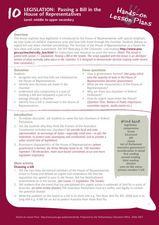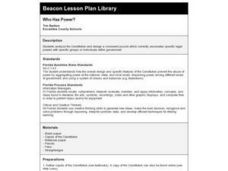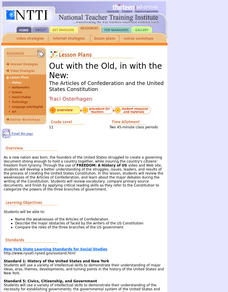Curated OER
The Supreme Court: The Judicial Power of the United States
Students investigate some basic facts about the Supreme Court by examining the United States Constitution and one of the landmark cases decided by that court. The operation of the Supreme Court forms the focus of the lesson.
Curated OER
Legislation: Passing a Bill in the House of Representatives
Students study the concept of legislation as it relates to passing a bill in the House of Representatives. In this legislation: passing a bill in the house of representative lesson plan, students identify why and how bills are introduced...
Judicial Learning Center
The Players in the Courtroom
Courtrooms are complicated. In addition to the many rules, there are a number of people whose jobs are not very clear to the casual courtroom observer. With the resource, individuals identify some of these roles and review more...
Judicial Learning Center
The Ratification Debate
Most Americans profess their love for the US Constitution, but this was not always the case. An informative lesson overviews the debate between the Federalists and Anti-Federalists by summarizing the main arguments of each side. It...
Judicial Learning Center
Article III and the Courts
What's the best way to make sense of the Constitution? A helpful lesson contains both the text of Article III and annotation of each of its sections, breaking it down into easy-to-understand parts. It also includes links to a glossary...
C-SPAN
How A Bill Becomes A Law
Seven steps are required for a bill to become a United States law. The Families First Coronavirus Response Act (H.R. 6201) is used as a model for the process of how a bill becomes a law. Class members work independently through a Google...
Judicial Learning Center
Levels of the Federal Courts
The Supreme Court gets all the glory, but very few federal cases make it to the highest court. An interesting lesson explores the structure of the lower levels of the federal court system. In addition to outlining the organization of...
Curated OER
Landmark Supreme Court Cases And The Constitution
Have an engaging class discussion on the Bill of Rights, U.S. Constitution, and the Supreme Court. Learners examine multiple aspects of the Marbury v. Madison case and the impact that case had on the judicial system in the U.S. Web...
PBS
The Roosevelts: An Intimate History—Snapshot Lessons
The Roosevelt family was one of the most influential and prominent political forces in the 20th century, leaving behind a wide-ranging legacy of conservation, progressivism, and economic growth. Learn more about President Theodore...
Judicial Learning Center
Your 1st Amendment Rights
Why should classes care about the First Amendment? An engaging lesson serves as a powerful tool for answering just that. As all four cases in the lesson relate directly to freedom of expression in schools, young scholars explore the...
National Endowment for the Humanities
George Washington: The Precedent President
Everyone knows that George Washington was the first president, but do your scholars know why that was so important? The lesson plan, the third in a sequence of three, allows learners to understand how George Washington set a precedent...
Judicial Learning Center
Your Day in Court
Whether out of choice or necessity, people want to know what will happen on a typical day in court. A helpful lesson walks scholars in the field of criminology through the trial process from opening statements to the final verdict.
Center for Civic Education
Constitution Day Rap
Engage your class while learning about the US Constitution with this fun primary grade social studies lesson. After viewing a picture of the US Constitution, young learners piece together a US flag using stars and stripes with facts...
Judicial Learning Center
Law and the Rule of Law
We hear a lot about the importance of the rule of law, but most people do not really know what those words mean. The lesson is a webpage that defines the rule of law, explains why it is important in a democratic society and provides...
Curated OER
Who Has Power?
Fourth graders discuss abuse of power in government and examine the Constitution for specific powers in each branch. They create a crossword puzzle utilizing terms and information regarding division of government powers and federalism
Curated OER
The Powers of Mom: Understanding the Legislative, Executive and Judicial Power
Tenth graders examine the powers of each branch of the government. They analyze the causes and effects of relationships within the government. They participate in activities to help them comprehend the material.
Curated OER
Issues Close to Home
Students discuss their role in their local government. Individually, they use various types of media to examine and take a position on a topic important to them. To introduce their position, they write a letter to the Board of...
Curated OER
Separation of Powers: Connecting the Separate Powers
Students study the concept of separation of powers. They recognize how the Constitution provides for separation of powers and categorize public officials into one of three branches of government. Students do a role play and see if...
Curated OER
U.S. Constitution - Checks and Balances
Students examine the separation of powers of the branches of the U.S. federal government. In this U.S. Constitution lesson, students listen to a SMART Board supported lecture on checks and balances of the Judicial, Legislative, and...
Curated OER
Out with the Old, in with the New
Eleventh graders review the weaknesses of the Articles of Confederation, and explore the major debates during the writing of the Constitution. They review vocabulary and compare primary source documents to study the three branches of...
Curated OER
Are We the People?
Students investigate their elected officials and their roles. For this governmental leadership lesson, students discuss the Constitution and research their elected officials. They also organize the information they find regarding the...
Curated OER
Essentials of the US Constitution
Learners determine how the content of the U.S. Government enables the U.S. Government to function. They examine the roles and functions of the three branches of government and how the separation of powers and checks and balances affect...
Curated OER
Checks and Balances in Supreme Court Nominations
Learners discover the system of Checks and Balances related to recent events prompting action by one or more of the three branches of government. They study the process for selecting and confirming a Supreme Court justice. They examine...
Curated OER
President's Day
Young scholars access prior knowledge about the branches of government to explore foreign policy. In this conflict resolution lesson, students reflect on foreign policy decisions and participate in scenarios based on foreign policy events.
Other popular searches
- Branches of Government
- Three Branches of Government
- 3 Branches of Government
- Branches of Government Chart
- Branches of u.s. Government
- Branches of Us Government
- The Branches of Government
- U.s. Government (Branches)
- Us Government Branches
- Federal Government Branches
- State Branches of Government
- Branches of Federal Government

























